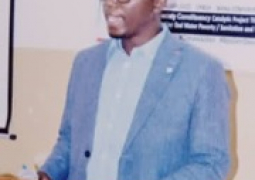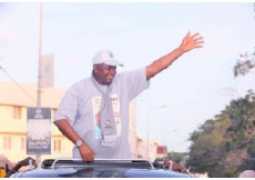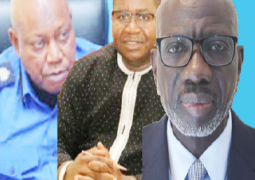This has left many writers grappling with the harsh reality of limited opportunities and support.
There are varying data and statistics concerning the exact literacy rate in The Gambia. However, there seems to be a consensus that at least over 55 percent of the population is literate as of 2023. Despite these seemingly promising numbers, the habit of regular reading remains a rare commodity in Gambian society.
Authors, though not shouting as loudly as they should, are grieving over this cultural deficiency. Many fear that the situation is not improving and see no signs of change on the horizon.
Babucarr Jobe, the acclaimed award-winning author behind 'Rights and Beyond,' shared his sombre perspective with The Point. "It is very difficult to market your books in The Gambia," he lamented in a wistful tone
Jobe attributed the struggle authors face to the prevailing low reading culture, revealing that most books find their audience only during launch events, sustained by pledges and donations.
Moreover, Jobe elaborated on the struggles authors face post-book launch ceremonies, emphasising the scarcity of readership and research culture in this small nation in West Africa, which has over the years produced great minds and brilliant intellectuals plying their trades across the world.
Even with relative eminence, Jobe confessed to the inadequacy of funds for his projects, exposing a lack of motivation from both society and the government to harness the full potential of Gambian writers.
"Despite relative eminence, recognition and the efforts of the Young Writers Association of The Gambia (YWAG)," Jobe confessed, "we are still limited in terms of finance, structure, and assistance."
Dawda Faye, a senior journalist at The Point newspaper and author of three books, echoed Jobe's sentiments, asserting, "Gambians don't read."
Faye laid bare the difficulties faced by emerging authors in selling their books, often unable to recoup printing and production costs. He further adduced that a vicious cycle of financial setbacks and discouragement becomes a formidable obstacle to building a writing career.
Modou Lamin Sowe, a celebrated Gambian writer and former secretary general of the Writers Association of The Gambia, in an exclusive interview, identified the "national problem of reading" as a primary impediment to the development of literature in the country.
“Young people are writing, publishing, and launching books almost every month, with less readership and attention from the public space,” he said.
Sowe, who doubles as the founder of the Young Writers Association of The Gambia (YWAG), contended that laziness had gripped the population, hindering their inclination to seek out books for learning and leisure.
This prompted a visit to Timbooktoo Bookshop, the country’s biggest bookshop located in Bakau`. Matida Ceesay, a staff at the bookshop, authenticated the assertions of the authors.
“Truly, people in this country don’t read,” she said, confirming the massive level of low readership, especially among the young, who are considered the future of this country.
Mbye Mboob, a qualified English teacher at the Kerr Amadou Basic Cycle in Jokadu, rural Gambia, attributed low readership, especially amongst students, to weak and limited vocabulary.
“Again, some people are easily distracted, and reading does not go with many distractions. In our societies, the distractions are just too much at times, and they indeed impede proper reading and understanding,” he hinted as the reason hindering even the few who wish to read.
Suggesting a solution, he underscored that students must be tremendously persuaded, encouraged and obliged to read to get them acquainted with it as they grow up. “If they do not get used to it at the initial stage, it would be quite challenging if you want them to put up with it,” he reasoned.
Modou Lamin Sowe advocated for the development of a national reading framework to rejuvenate the diminishing interest in reading and uplift the literary landscape in the country, emphasising the need for support from the government and private sectors.
Nonetheless, other passionate writers have begun taking steps, going extra mile to enlighten the public. Hadijatou Jobe – the emerging author of ‘The Broken Home’ and ‘The Successful Dreams’ – aims to spearhead a literary revolution across the nation by encouraging reading amongst students. A student herself at Nustrat High School, her target is to meet at least 5,000 fellow students.
In that vein, she recently began an initiative touring schools across the nation, engaging in peer-to-peer discussions and organising small-scale training sessions.
In response to the silent reading crisis, The Young Writers Association of The Gambia partnering with the Writers Association of The Gambia (WAG) has also been on the frontline, taking proactive steps and organising events, such as the National Storytelling competition, the Kunta Kinteh International Book Festival, and the Gambia Prize for Literature.
They have also been observing the World Book Day and the African Languages Week, aligning their efforts with SDG goal 4.
But all these grand initiatives stand at the mercy of funding and public support. Hence, progress has been very limited despite the collective determination.
The plea from the literary community is clear: The Gambia needs a concerted effort to foster a thriving reading culture. There is a collective belief that it is time for The Gambia to turn the page and write a new chapter for its literary future.




